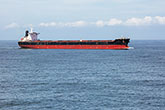Oldendorff Carriers relocates certain transhipment equipment
Published by Harleigh Hobbs,
Editor
Dry Bulk,
According to a recent news release from Oldendorff Carriers, the company has decided to relocate certain project equipment in order to best serve its customers and adapt to their requirements.
The transhipment platform “Lena” was towed from Guyana to Trinidad where it was loaded on the semi submersible vessel “Trustee”, and transported to Batam, Indonesia. Also transported to Indonesia were the tug “Kiev” and the crew boat “Christine”. Simultaneously with her regular dry docking, the height of the cranes on the “Lena” will be increased at a shipyard in Batam to be capable of transhipping cargo from capesize bulk carriers.
The company has recently towed the floating crane “Mia” from Trinidad to Guyana. The “Mia” is a pontoon fitted with a Figee Lemniscate 36 t crane. While in Trinidad the crane was used together with three other floating cranes to tranship iron ore, coal and bauxite from supramax and panamax vessels to capesize vessels. In Guyana, the “Mia” will be used for bauxite loading in the basin of the Berbice River in order to achieve a quicker loading of the Oldendorff vessels.
The “Mia” will also be used for storing the spares and docking the pilot boats.
Two new Damen 1605 crew boats were purchased in Singapore for the company’s Trinidad operation and were given Trinidadian names “Carnival” and “J’ouvert”. They were loaded in the spare cargo hold of an Oldendorff chartered vessel “Mandarin Fortune” and transported to Trinidad.
Read the article online at: https://www.drybulkmagazine.com/ports-terminals/10042017/oldendorf-carriers-relocates-certain-transhipment-equipment/
You might also like
Bearing AI launches first AI-powered planning tool for shipping liners
Bearing AI has announced the launch of the first AI-powered planning tool for shipping liners to simulate the cost, emissions and performance impact of operational and commercial decisions.

